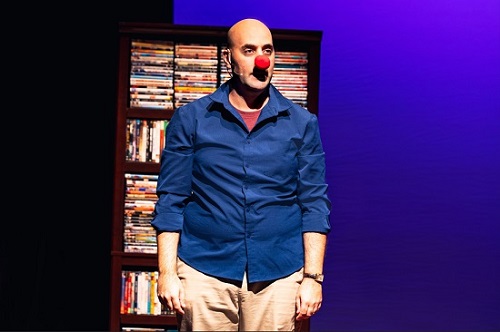The Citiblog
Review: Clowns Like Me Is On The Nose
July 4, 2024, 5:25.56 pm ET

Photo: Rebecca Michaelson
By Brian Scott Lipton
If, like me, you’re still recovering from Eddie Redmayne suddenly emerging on stage dressed like Stephen King’s Pennywise in “Cabaret,” your natural inclination may be to stay away from a show titled “Clowns Like Me.” But unless you’re going to be completely freaked out by performer Scott Ehrenpreis briefly donning a red nose or the on-stage sight of a bookcase filled with 20 (admittedly beautiful) antique clowns, you should reconsider heading over to the DR2. As it happens, this 70-minute solo show proves to be far more moving and educational than frightening.
Written and directed by Jason Cannon, but based completely on Ehrenpreis’ real life, “Clowns Like Me” is an incredibly honest and vulnerable – if not particularly funny – examination of Ehrenpreis’ lifelong battle against mental illness.
Part lecture, part staged memoir, the show’s primary purpose, as Ehrenpreis points out repeatedly, is to “change the conversation” on how we view mental illness – and the people who deal with it every day of their lives. Unsurprisingly, there are many valuable lessons imprarted that we should all take to heart. (The biggest one: Never tell people who suffer from depression to “just cheer up” or “snap out of it.”)
A bald, stocky middle-aged man with a booming voice (perhaps the result of his considerable training as an actor), Ehrenpreis doesn’t appear to be any different than the hundreds of people a New Yorker encounters every day. But within the show’s first half-hour, we learn he not only has obsessive-compulsive disorder (OCD) – complete with six separate obsessions – as well as bi-polar disorder and sociophobia, all of which have severely impacted his personal and social life. (In fact, Ehrenpreis says the only time he feels free is when he’s acting.)
He doesn’t mention any current use of drugs to combat these conditions – in fact, he clearly disliked being prescribed them as a child when doctors though he had ADD (attention deficit disorder) – or go into any real detail about therapy. What he does talk about, with remarkable frankness, is the consequences of living with loneliness, low self-worth and the inability to get close to people, all of which haven’t completely broken him – but might break your heart.
The show is rather simply staged (Cannon also did the minimal set design) with a few effective lighting effects (by Xiangfu Xiao) and sound designer (by Sean Hagerty) that complement the storytelling. And it’s the stories you will hear that will probably stay with you after you exit the theater.
Can you imagine being sent to jail for shoplifting some DVDs from Walmart, hiring a stripper for a one-night “girlfriend experience,” or stealing money from your sleeping father’s wallet, then being caught and thrown out of your parents’ house -- and afterwards having no communication with them for four years? These are among the more harrowing stories Ehrenpreis bravely shares with us, asking not for pity, but for some kind of understanding.
In an effort, I suspect to “lighten the mood,” there are also a couple of more banal true-life tales, including his childhood experience at a karate sleepaway camp or summers playing Scooby-Doo at a popular theme park, neither of which I found overly illuminating.
Still, one senses every experience that has happened to Ehrenpreis is one piece of his giant, personal jigsaw puzzle. That’s something all of us –whether we think are clowns or not – can relate to.
SEE DETAILS/TICKETS
OUR LATEST BLOG POSTS

Review: Should You Turn Left on Tenth?
October 24, 2024, 2:18 am ET
By Brian Scott Lipton There’s a major aphorism that is often told to us: “A little knowledge is a dangerous thing.” And sadly, that warning has proven true for those of us who wat... READ MORE

Nightly’s Brings Bistro Fare to the Upper East Side
October 23, 2024, 5:51 pm ET
Nightly’s, a fresh take on the classic New York bistro, has opened on corner of 78th Street and Second Avenue. Featuring craft cocktails, an expansive wine list, and dishes that include a mix ... READ MORE

Twin Tails Brings Southeast Asian Flavors to Midtown
October 22, 2024, 7:30 pm ET
Twin Tails, the latest restaurant from Quality Branded—the group behind popular NYC spots like Zou Zou’s and Don Angie—has officially opened its doors at 10 Columbus Circle. With a... READ MORE


 Sign up for our newsletter !
Sign up for our newsletter !